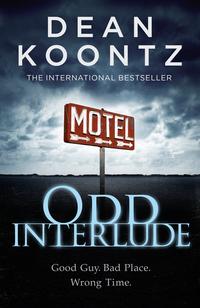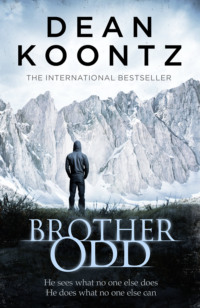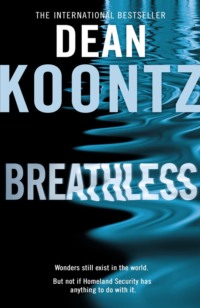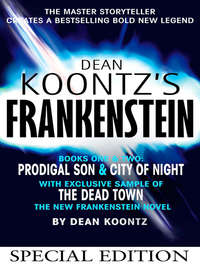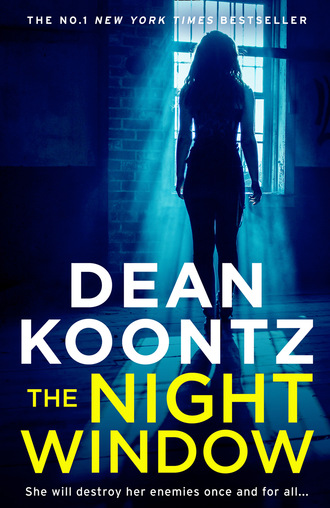
Полная версия
The Night Window
“I keep saying I will, but I don’t.”
“Girl like you has options.”
“So far none better than him.”
“They play too much video game.”
“Who does?” Jane asked.
“This generation men. Video game, porn, Internet—they don’t know how to be real anymore.”
“Prince Charming is dead,” Jane agreed.
“Not dead. Just lost. We need to find. You can’t find when you won’t look.”
“Maybe you’re right. Do you keep looking for him?”
“I look, I hope, I date—but always with knife in purse.”
“Really? A knife in your purse?”
The waitress shrugged. “Is L.A. A girl can’t take chances these days.”
Jane nursed the second beer through another hour, watching the motel while pretending to be waiting for Mr. Wrong. The homeless man with the shopping cart moved on to defecate elsewhere. The elastic shadows stretched eastward. The traffic quarreled in greater volume through the street, as if there were no other avenue in all the world, every traveler bound frantically for the same and perhaps terrible place. Counting Sheep continued to represent itself as innocent and safe.
Excessive hesitation was the mother of failure. Winning required considered action. Get off the X. Move.
She returned to the motorcycle parked on the side street. She cruised around the block, pulled into the motel lot, and parked in front of Room 5, two doors north of the unit in which she’d left her luggage.
No one was currently in the immediate vicinity. If she was a figure of interest to someone, he might be watching her from behind a window, through parted draperies.
She took off her helmet, left it on the seat of the Big Dog, and went boldly to Room 3.
High situational awareness. In Condition Yellow. No eyes in the back of her head, but alert for any sound that didn’t belong in the basketweave of street noise.
She keyed the door and pushed, and it swung into a coolness of shadows, revealing the furniture as colorless shapes in the gloom.
Before crossing the threshold, she slid her right hand under her sport coat, to the grip of the pistol in her shoulder rig.
Warily, she glanced back at the parking lot, at the street, at the motel office to the south. Nothing.
A single-file succession of fat crows, eerily silent for their raucous kind, passed low overhead. Crisply defined shadows, blacker against the pavement than the birds were black against the sky, glided past her feet, as if to encourage her to flee with them.
She was not Jane Hawk. She was Leslie Anderson. If her pursuers knew about the Anderson ID and this motel, they would have come for her in this place rather than at the library. Somehow they knew about the car, but only the car.
She entered, closed the door, switched on lights. A housekeeper had been here. The bed was made. The fragrance of an orange-scented aerosol freshened the room, though under it lay the faint lingering staleness of marijuana smoke from some previous guest. The door to the small bathroom stood open wide, and a frosted window admitted enough light to reveal that no one waited in there.
All seemed the same as when she had checked in the previous afternoon. Nonetheless, she sensed a wrongness in the room that she could not define.
Two sliding mirrored doors served the closet. As she approached them, she looked not at her image, but at the reflection of the room behind her, which seemed somehow strange and not an exact likeness, as if a threat thus far invisible might materialize from some dark dimension suddenly folding into this one.
Engine noise swelled as a vehicle pulled off the street and into the motel lot. She focused on the room door reflected in the mirror before her. The engine died. A car door slammed. She waited. Nothing.
Sometimes in the deep of night, when the sleeper’s fantasy is benign—a golden meadow, an enchanting forest—anxiety arises with no apparent cause, just before the dream is invaded by men without faces, whose fingers are razor-sharp knives. Her disquiet now was akin to the dreamer’s apprehension, the cause intuited rather than perceived.
As she slid the left-hand closet door to the right, it stuttered slightly in its corroded tracks. Her two suitcases were gone. She pushed both doors to the left. The other half of the closet also proved to be empty.
She drew the Heckler & Koch Compact .45 and turned to the room, which had taken unto itself the strangeness that she had previously perceived only in the mirror, so that every mundane object seemed to have an alien aspect, malevolent purpose.
The bathroom window was too small to serve as an exit. The room door offered the only way out.
Draperies with blackout linings covered the window to the left of the door. She would gain nothing by parting those greasy panels of fabric to see what awaited her outside. Whatever it might be, she had no choice other than to go to it.
Pistol in hand but held under her sport coat, she opened the door. After the lamplit room, the sun-shot world made her squint. She stepped outside.
The Big Dog Bulldog Bagger had disappeared. To her left, in front of Room 1, under an ill-kept phoenix palm, stood the metallic-gray Ford Explorer Sport that she had abandoned at the library several towns from here.
Neither of the exits from the motel parking lot was blockaded. No cops. No plainclothes agents.
All seemed counterfeit, as if the street were only a movie set on a studio backlot.
In the new world aborning, reality seemed frequently displaced by virtual reality.
Most people were so enchanted by high technology, they didn’t see its potential for oppression, but Jane was aware of the darkness at the core of the machine. The current culture deviated radically from previous human experience, ruthlessly reducing each woman and man to mere political units to be manipulated, balkanizing them into communities according to their likes and dislikes, so everything from cars to candy bars could be more effectively marketed, robbing them of their privacy, denying them both a real community of diverse views and the possibility of personal evolution by censoring the world they saw through the Internet to make it conform to the preferred beliefs of their self-appointed betters.
In such a world, there were daily moments like this one at the Counting Sheep Motel, across the street from Lucky O’Hara’s Bar and Grille with its smiling leprechaun and pot of gold, situations that felt unreal, that suggested the world had come unmoored from reason.
A man sat in the front passenger seat of her Explorer. In the shade of the big tree, with patterns of palm fronds reflected on the windshield, little of him could be seen.
As Jane approached the driver’s door, she held the pistol at her side, against her leg.
The window in the driver’s door was down, allowing her a better view of the guy who waited for her. She knew him. Vikram Rangnekar of the FBI.
1
The wind did not shriek, but moaned as if Nature had fallen into despair, and the snow slanted out of the northwest with none of the softness that the scene suggested, so that Tom Buckle turned his back to the icy teeth of the blizzard.
His vision cleared as the tears that the wind stung from his eyes briefly warmed his cheeks. In the gray spectral light of the hidden and fast-declining sun, the vast plain seemed not to fade into the storm, but to be dissolving at its farthest edges, crumbling away into some white void.
He looked southwest toward the great house. The lights were not entirely screened by the snow, but there weren’t even vague window shapes or identifiable lampposts, only a low hazy amber glow to mark the location of the distant residence. Tom yearned for the warmth within Wainwright Hollister’s walls. He briefly fantasized about returning to steal a vehicle—something big like the VelociRaptor or the armored Gurkha—and escaping overland or battering through some formidable gate at the entrance to the ranch. However, he believed what he’d been told about the security system’s ability to detect his approach and about the ruthlessness with which he would be machine-gunned.
For precious minutes, with his two hours of lead time ticking away, he stood in indecision, unable to set out in one of the directions that were not forbidden to him. He had no paths to follow. And in the arc of escape allowed him, each of those two hundred seventy degrees appeared to be a direct route to certain death. He was not an outdoorsman. His survival skills were limited to the savvy that kept his film career alive, and that had not yet proved to be enough to put him on even the B list of directors. As the child of a tailor and a seamstress, having spent thousands of hours watching uncounted movies, his experience of the natural world was limited to city parks, public beaches, and documentaries. In this immense, unpopulated snow-swept tract of land, he simply didn’t know the first thing to do any more than if he had just stepped out of a starship onto the surface of a planet at the farther end of the galaxy.
He felt small and vulnerable, as he hadn’t felt since childhood. His breath plumed from him in pale ghostly vapors, as if with each exhalation he were shedding a fraction of the spirit that inhabited his too-mortal flesh.
If he didn’t know how to survive, one thing he did know was that Hollister would never mount the fair pursuit he promised, that the crazy sonofabitch wouldn’t come on foot, but in an all-wheel-drive vehicle. And the billionaire would be tracking his quarry by means far more sophisticated than reading footprints and sifting spoor from the masking snow.
Before leaving California, Tom had checked out Crystal Creek Ranch on the Internet. Google Street offered no images, but Google Earth provided extensive satellite photographs. He had been dazzled by the size of the main residence and its associated buildings, enchanted by the verdant vastness of these twelve thousand acres.
Now he remembered the watercourse for which the ranch was named. Less of a creek than a small river, it spilled out of the western highlands and flowed past the house, southeast through various woods and meadows, continuing far beyond Hollister’s property and eventually passing under Interstate 70.
Using the glow of the distant residence as a reference point, Tom tried to call to mind the satellite images of the ranch and remember the route by which the interstate proceeded somewhat south and then more directly east toward Kansas. His recollection was at best hazy.
He had no idea how many miles he would have to walk in order to reach the highway. Thirty? Fifty? It was so distant that even on a clear night the headlights of the traffic could probably not be seen from here. Yet the interstate offered his only hope of finding help.
The Hollister property was surrounded by other enormous—and lonely—ranches, as well as by unpopulated federal territory. He might wander for days and never encounter a neighbor or a single government land manager.
Carrying the drawstring bag containing the tactical flashlight, he set out south-southeast. He wondered how he would maintain that course when distance and the bleak deluge screened from him the lights of the house, which were his only reference point.
Perhaps a hundred and fifty yards ahead lay a pine woods expressed like vertical strokes of an artist’s charcoal on white paper, robbed of detail by the waning light and waxing weather. The river ran through some but not all of the ranch’s woodlands. If he got lucky and found it among these nearest trees, he could make his way along its banks to the interstate without fear of becoming disoriented and lost in the blizzard. If nothing else, the woods seemed to offer cover.
Tom didn’t bother to check the wristwatch they had allowed him to keep. It didn’t matter whether fifty-five or fifty-six minutes of the promised two-hour lead remained. He surely did not have that much time. Not really.
Hollister was a murderer. Murder was not merely a crime but also a lie, for it made a claim that some lives had no value. If the billionaire could deny the fundamental truth of the profound meaning of every life, he was a liar’s liar, a font of falsehood. He might already be on the hunt.
With fresh powder pluming from his boots, the rotten drifts of other days and tangled masses of frozen grass crunching underfoot, Tom crossed the meadow, leaving a trail that would not quickly be filled in his wake. Erratic wind not only drove the falling flakes but also fashioned them into pale shapes, phantoms in graveclothes, that hastened across the plain in the weak and dimming light. The land seemed haunted. The world had become so strange that he would not have been surprised if a figure more solid than the apparitions of snow had suddenly loomed before him, a naked beauty with her ruined face concealed by a shimmering mask of scarlet silk.
2
The Counting Sheep Motel in its slow disintegration. The hive hum and swarm buzz of traffic, the amplified serpent hiss as a bus air-braked for passengers waiting on a bench, in the distance the hard tat-tat-tat-tat-tat of what might be either a jackhammer or an automatic weapon. Bright orange sun, ink spill of purple shadows seeping eastward.
In the front passenger seat of Jane’s Explorer Sport, warming the moment with his smile, Vikram Rangnekar said, “Hello, Jane.”
Jane stood at the open window in the driver’s door, pistol drawn, muzzle pointed at the pavement. “What is this?”
“I’ve missed you.”
“Been busy.”
“I lie awake at night worrying about you.”
“I’m okay.”
“You look okay. You look fabulous.”
“So … what is this?” she asked again.
“The disguise is optimal cool. It’s good.”
“Maybe not good enough.”
“May I say, you’re prettier without it.”
“Looking hot isn’t my main objective these days.”
“I have no gun. I mean you no harm.”
“Puts you in a damn small minority.”
“If you don’t shoot me, I can be of great help to you.”
“You’re FBI.”
“Not an agent. Never was. Just a computer buccaneer who used to work for the FBI. I resigned two weeks ago.”
Vikram was a white-hat hacker of great talent. Occasionally the Department of Justice had poached him from the Bureau and put him to work on what would have been criminal black-hat projects if they had not been conducted under the auspices of the nation’s primary law-enforcement agency. He’d had an innocent crush on her even when Nick had been alive, though he knew that she was—and always would be—a one-man woman, and he’d liked to impress her with his mastery at the keyboard. As an agent, before going rogue, Jane had always operated by the book, never resorting to illegal methods. But she had wanted to know what the corrupt inner circle at Justice might be doing, and she had encouraged Vikram to show off. He had developed back doors—“my wicked little babies”—to the computer systems of major telecom companies, alarm-company central stations, and others, and he had instructed Jane in their use. Once she had gone rogue, the ability to ghost through those systems without being detected had more than once gotten her out of a tight corner.
“If I weren’t your friend,” he said, “there would be like a hundred agents here, a SWAT team, helicopters, dogs, bomb robots. But it’s just me.”
“Not only the government wants to wring my neck.”
“Yeah, there’s some freaky group calling themselves Techno Arcadians, but I don’t know what they’re all about.”
Surprised by his knowledge, even as limited as it was, she surveyed her surroundings. Nothing amiss. She looked at Vikram again. “How do you know about the Arcadians? They don’t advertise.”
“Get in. Take us for a drive. I’ll explain.”
“Who were those people at the library?”
“Family. A brother. An uncle. Cousins. You look wonderful.”
“Where are my suitcases?”
“In the back. Take us for a drive. I’ll explain.”
“I don’t want to kill you, Vikram.”
“Good. I don’t want to be killed.”
“So don’t make it necessary.”
She holstered the pistol and climbed behind the wheel of the Explorer and pulled the driver’s door shut.
3
For three days, Charles Douglas Weatherwax waits in a luxurious suite in the Peninsula Hotel in Beverly Hills, anticipating his next assignment. He is a tall, strong, graceful man with a face of such clean, stylized lines that it looks like an Art Deco work worthy of being the hood ornament on a high-end automobile in the days when cars had hood ornaments and didn’t all look alike. He follows a high-protein low-carb diet, takes eighty vitamin pills a day, every twelve hours drinks a health product called Clean Green, and never fails to apply a number-fifty sunscreen after shaving. Each day before dinner, he sets out from his hotel on a long walk, which in part takes him through the park across the street.
During these strolls, as at all other times, he is looking for something that will justify his existence. There are people, sad cases, who never find their purpose in life. Charlie is not one of them. He has long known the meaning of his life, and he finds his mission deeply fulfilling.
During his first tour of the park, on Wednesday afternoon, he encounters a blind man sitting on a bench, in the shade of a trio of palm trees. The guy is fiftysomething. Shaved head. Neatly trimmed salt-and-pepper beard. An MP3 player rests on the bench beside him. Without an earpiece, he listens to Jeremy Irons read T. S. Eliot’s “Burnt Norton,” the first of the poet’s Four Quartets.
The listener’s blindness is suggested by dark glasses worn in the shade, implied by a white cane propped at the side of the bench, and confirmed by a beautiful German shepherd lying at its master’s feet. The grip of the leash lies untended on the bench, testament to the seeing-eye dog’s obedience and dedication.
“Time past and time future / What might have been and what has been / Point to one end, which is always present …”
Jeremy Irons reads the lines without artifice. His straightforward presentation speaks powerfully to Charlie Weatherwax.
Charlie doesn’t interrupt the poem but continues on his way without a word to the blind man.
From childhood—he is now thirty-four—he was taught the importance of committing random acts of kindness. His father was a community organizer with a genius for winning grants to improve the quality of life in less fortunate neighborhoods, and his mother was a high school principal, later a district superintendent. Both are now retired. He has often heard them speak of the rewards of a life of service; random kindness is key to their self-image.
The following afternoon, Thursday, he discovers the blind man on the same bench, in different clothing but listening now to “The Dry Salvages,” the third of Eliot’s Four Quartets. On this second encounter, Charlie realizes that he must act. But by doing what?
“There is no end of it, the voiceless wailing / No end to the withering of withered flowers …”
Charlie passes the blind man and his dog, the voice of Jeremy Irons propelling him as if he is a leaf on the surface of a swift stream.
He says nothing, does nothing—and throughout the remainder of the day regrets his inaction. By dinnertime, his regret has grown into remorse, a sharp-toothed guilt gnawing at his heart. His sleep is troubled. There is little chance that he will encounter the blind man again and be able to make things right.
Yet now, later Friday afternoon, at the same hour as before, Charlie comes upon the sightless listener in the park. Fortunately, he has prepared for this most unlikely third chance.
“Beautiful dog,” he says, and scratches the shepherd under the chin and sits on the bench. “What’s his name?”
Clicking off the audiobook, the man says, “Argus. He’s a treasure.”
“Unusual name for a dog.”
The guy looks toward the sound of Charlie’s voice rather than directly at his face. “In Greek mythology, Argus was a giant with a hundred eyes.”
“Ah. Unusual but apt. You were listening to T. S. Eliot.”
“Yes, the Four Quartets. I never tire of it. So allusive and layered, words as music. It’s a kind of meditation for me.”
“Beautiful,” Charlie agrees. “However, its meaning has always stumped me, I’m afraid, too complex for my feeble brain. His cat poems are more my speed.”
The blind man smiles. “Old Possum’s Book of Practical Cats. Amazing that he could write works of great depth and some of the most charming light verse ever put to paper.”
Charlie quotes, “‘Jellicle cats come out tonight / Jellicle cats come one come all …’”
Argus’s master recites, “‘The Jellicle moon is shining bright / Jellicles come to the Jellicle ball.’”
Hoping for the chance to rectify his previous failure to engage the blind man, Charlie has brought with him a hamburger patty spiced and cooked to perfection by the Peninsula Hotel’s room-service chef.
Approaching the bench, he’d taken it from a small plastic bag. Now he drops the meat on the park path in front of the dog.
Quoting the four opening lines from “Macavity: The Mystery Cat” louder and with less grace than Jeremy Irons might have performed it, Charlie covers the sound of the shepherd quickly consuming the patty and then says, “Name’s Harvey Hemingway, no relation. Friends call me Harv.”
“John Duncan,” says the bald and bearded fan of Eliot. “Pleased to meet an admirer of Old Possum.”
Charlie chats him up for a few minutes and then, when no one is close to them, no one approaching along the path, he says, “I gave Argus some hamburger—”
“Oh, I wish you wouldn’t have,” says Duncan.
“—laced with a fast-acting sedative,” Charlie says.
Alarmed, the blind man stiffens and calls the dog’s name. When there is no response, he fumbles for and locates the grip loop of the leash where it lies on the bench. He tugs, but Argus is deep in dreamland.
“He’ll be out for maybe two hours and groggy for an hour after that,” Charlie says, “but no permanent damage.”
“What the hell is this?” Duncan demands, putting some steel in his voice, as if he is capable of following through on a threat, as if he is Samson, eyeless in Gaza, but still possessing the strength to defeat his enemies.
Charlie puts a hand on his companion’s shoulder. “Listen to me, shithead, and listen close. There’s no one near us in the park. Lots of traffic out there on Santa Monica Boulevard, but all they see is two friends on a bench. They call L.A. the City of Angels, but there are angels in Hell, too, and they’re not the kind would do you any kindness. You call for help, you make a sound, no one will hear or care—and I’ll blind your dog. I have a sharp penknife. I can do it easy.”
John Duncan is as still as if he were a bronze figure of a man installed on the bench as a sculpture.
“What I’m going to do,” Charlie explains, “is shock you hard with a handheld Taser. I’ll do it three times. Each time longer than the one before. It’s going to hurt like hell. If you scream or cry out, I blind Argus and leave. In fact, you do any more than whimper like a baby, the dog will need a seeing-eye dog of his own. You hear me? You understand?”
“Why?” Duncan asks.
“You’ve heard about people who want to make the world a better place by doing random acts of kindness? Well, they’re a bunch of phonies. They live a lie and love it. There’s nothing real about them. I’m the real deal. I’m what the world is truly about—acts of random cruelty.”
As Charlie reaches under his sport coat and withdraws the Taser from a holster, Duncan leans forward, hands clasping his thighs, and pleads, “Please don’t. For God’s sake—”



